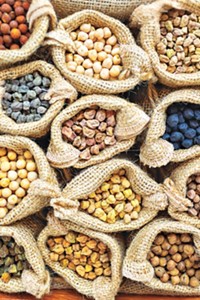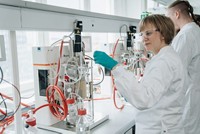Advertisement
Grab your lab coat. Let's get started
Welcome!
Welcome!
Create an account below to get 6 C&EN articles per month, receive newsletters and more - all free.
It seems this is your first time logging in online. Please enter the following information to continue.
As an ACS member you automatically get access to this site. All we need is few more details to create your reading experience.
Not you? Sign in with a different account.
Not you? Sign in with a different account.
ERROR 1
ERROR 1
ERROR 2
ERROR 2
ERROR 2
ERROR 2
ERROR 2
Password and Confirm password must match.
If you have an ACS member number, please enter it here so we can link this account to your membership. (optional)
ERROR 2
ACS values your privacy. By submitting your information, you are gaining access to C&EN and subscribing to our weekly newsletter. We use the information you provide to make your reading experience better, and we will never sell your data to third party members.
Agriculture
Seed partners unveil photosynthesis trait
Benson Hill and Beck’s say corn varieties with the modified gene will yield more per acre
by Melody M. Bomgardner
May 15, 2018

The biotech firm Benson Hill Biosystems and the seed company Beck’s say their six-year-old partnership has yielded a trait that increases the efficiency of photosynthesis in hybrid corn.
The trait, a result of traditional genetic modification with noncorn DNA, has been tested in field trials for three years, the partners say. The trials show it significantly increases yields in a range of environments and in different corn hybrids.
Genetically modified corn varieties have been around since 1996, when Monsanto brought the first corn tolerant to glyphosate to the U.S. market. Insect-resistant corn, with genes borrowed from Bacillus thuringiensis (Bt), followed.
The move to add increased yield to the trait portfolio marks a rare case of plant breeders playing offense rather than defense when working to improve crops, says Benson Hill CEO Matt Crisp.
“There has not been nearly the development dollars and research effort in traits around nondefensive traits compared to those for, say, insect resistance,” Crisp says. “There are a lot of targets that have not received attention: photosynthesis, sustainability, and nutrition. It’s a ripe area of opportunity to innovate.”
Crisp won’t disclose the organism that is the source of the hopped-up photosynthetic ability. But he says it makes the corn plant more efficient at fixing carbon from atmospheric CO2 and turning it into sugar. The ability results in a mid-single-digit or higher percentage increase in yield, partly because each cob contains more kernels.
In addition to genes from noncorn species, future yield growth could come from techniques that edit traits native to corn, Crisp says. And Benson Hill is not the only small biotech firm working on yield. This year, Yield10 Bioscience is field testing gene-edited Camelina, an oilseed crop.





Join the conversation
Contact the reporter
Submit a Letter to the Editor for publication
Engage with us on Twitter